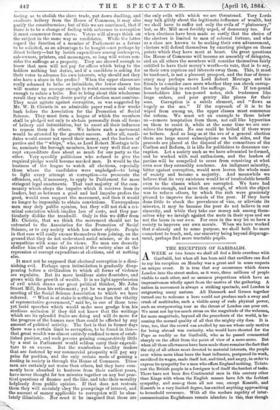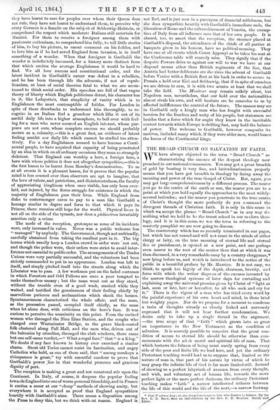THE RECEPTION OF GARIBALDL A WEEK or two hence we shall
all feel a little overdone with Garibaldi, but when all has been said that cavillers can find to say his reception on Monday was a great and in some respects an unique event. It is true that any occurrence which draws London into the street makes, as it were, three millions of people visible to each other, and so assumes proportions which have an impressiveness wholly apart from the motive of the gathering. A nation in movement is always a striking spectacle, and London is outgrowing many nations. All Denmark and Greece together turned out to welcome a hero would not produce such a sway and crush of multitudes, such a visible array of rude physical power, such an overpowering roar as the throat of London can pour out. We must not lay too much stress on the magnitude of the welcome, for mere magnitude, beyond all the precedents of the world, is be- coming the normal quality of all that the mighty city does. It is true, too, that the crowd was swelled by masses whose only motive for being abroad was curiosity, who would have shouted for the Pope as readily as for Garibaldi, who as he passed commented sharply on the affair from the point of view of a mere scene. But when all these allowances have been made there remains the fact that the city of all others most devoted to material interests, the people over whom mere ideas have the least influence, postponed its work, sacrificed its wages, made itself hot, and tired, and angry, in order to express its sympathy for a man who offers England nothing. Tointe- rest the British people in a foreigner is of itself the hardest of tasks. There have not been five Continental men in this century other than Kings with whom the English masses have felt the feeblest sympathy, and among them all not one, except Kossuth, and Kossuth in a very limited degree, has excited anything approaching to household reverence. With all the modem rapidity of inter- communication Englishmen remain islanders in this, that though they have learnt to care for peoples over whom their Queen does not rule, they have not learnt to understand them, to perceive why every German is a fanatic on the subject of Schleswig-Holstein, or comprehend the respect which moderate Italians still entertain for Mazzini. For them to receive a foreigner among them with passionate enthusiasm, to comprehend him fully, to tell little stories of him, to buy his picture, to resent comment on his foibles, and to love him as if he had saved England from invasion, is in itself something of a wonder. When that foreigner is Garibaldi the wonder is indefinitely increased, for a history more distinct from that which excites the average Englishman it would be hard to find. We all love success and constitutional order, and the latest incident in Garibaldi's career was defeat in a rebellion, and he has been through life the advocate, if not of repub- licanism, at least of social theories fatal to what we are accus- tomed to think social order. His speeches are full of that vague theory of liberty which English politicians detest, his character has in it, like Lafayette's, that simplicity of vanity which is to Englishmen the most contemptible of foibles. For London in spite of these drawbacks to understand him thoroughly, to re- cognize in an Italian Red a grandeur which lifts it out of its sordid daily life into a higher atmosphere, to boil over with feel- ing for a man who never secured an English interest, whose pur- poses are not ours, whose complete success we should probably mourn as a. calamity,—this is a great fact, an evidence of latent feeling amidst our daily life which cannot be studied too atten- tively. For a day Englishmen seemed to have become a Conti- nental people, to have acquired that capacity of being penetrated by an idea in which on all ordinary occasions they seem so strangely deficient. That England can worship a hero, a foreign hero, a hero with whose politics it does not altogether sympathize,—this is the first lesson to be learnt from Monday's demonstration. To us at all events it is a pleasant lesson, for it proves that the popular mind is less crusted over than observers are apt to imagine, that the love of valour, and patriotism, and disinterestedness, the faculty of appreciating kingliness when once visible, has only been over. laid, not injured, by the fierce struggle for existence in which the majority of Englishmen pass their lives. While England from duke to costermonger cares to pay to a man like Garibaldi a homage similar in degree and form to that which it pays its Princes, there remains still hope for the world. Physical force is not all on the side of the tyrants, nor does a plebiscitum invariably sanction only a crime.
The mode of the reception, grotesque as some of its incidents were, only increased in value. Never was a public welcome less " managed" by anybody. The Government, though not unfriendly, carefully abstained from taking the smallest part in it. The big horses which usually keep a London crowd in order were not out, and though the police were, their orders were strict to avoid inter- ference not essential to public order. The arrangements of the Trades Unions were very partially successful, and the volunteers had been strictly commanded to put in no appearance. London was left to itself, and simply pitched itself into the streets along which the Liberator was to pass. A few workmen put on the faded costumes in which Foresters and Odd Fellows are once a year tempted to make themselves uneasy ; but the mass went out as they stood, without the trouble even of a good wash, smoked while they waited, and testified the genuineness of their feeling chiefly by marvellous patience and acclamations which shook the houses. Spontaneousness characterized the whole affair, and the mass, as the procession passed, occupied itself chiefly, as the mass when let alone does, with criticisms on the hero's face. It was curious to perceive the unanimity on this point. From the excited women who thronged the Nine Elms Station, and the roughs who charged over Westminster Bridge, to the grave black-coated folk clustered along Pall Mall, and the men who, driven out of the balconies by crinoline, thronged the club windows, there came but one self-same verdict,—" What a regal face F' that " is a King." We doubt if any face known in history ever exercised a similar charm. Stout old Tories cannot resist its fascination, and angry Catholics who hold, as one of them said, that " among monkeys a chimpanzee is great," try with resentful candour to prove that Garibaldi's power lies in that wonderful presence and gracious dignity of port.
The reception is making a great and not unnatural stir upon the Continent. In Italy, of course, it deepens the popular feeling towards England into one of warm personal friendship, and in France it excites a sneer at our "cheap" methods of showing amity, but everywhere it is accepted as proof that England sympathizes heartily with Garibaldi's aims. There seems a disposition among the Press to deny this, but we think without reason. England is
not Red, and is just now in a paroxysm of financial selfishness, but she does sympathize heartily with Garibaldi's immediate ends, the liberation of Rome and the enfranchisement of Venetia, the exemp- tion of Italy from all influence save that of her own people. It is absurd, too, to assert that the reception, the steamer placed at Garibaldi's disposal, the attendance of the chiefs of all parties at banquets given in his honour, have no political meaning. They have one at all events which Count Apponyi as he takes his seat at. the Conference table will scarcely miss. They signify that if the despotic Powers drive us against our will to war we have at our disposal means other than British regiments of the line, that Austria had better deliberate ere she risks the advent of Garibaldi before Venice with a British fleet at his back in order to secure to Prussia a hold over Kiel and Schleswig, that if in spite of ourselves we are driven to arm, it is with two armies at least that we shall take the field. The Moniteur may remain sulkily silent, but Napoleon sees, nevertheless, that our hold over the nationalities almost rivals his own, and will hesitate ere he concedes to us by affected indifference the control of the future. The masses may see in Garibaldi only a kingly man who has fought with successful heroism for the freedom and unity of his people, but statesmen see besides that a force which for aught they know in the inevitable contest towards which Europe is drifting fast, may hold the balance of power. The welcome to Garibaldi, however composite its motives, included many which, if they were abler men, would loosen the knees of the Continental kings.































 Previous page
Previous page